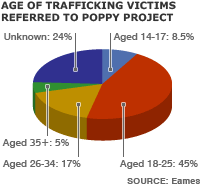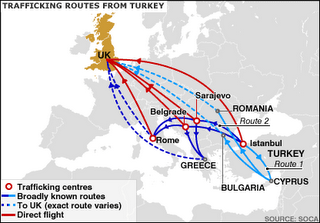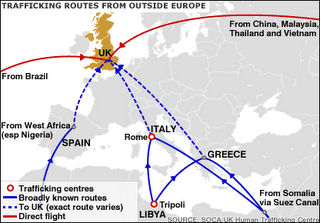Taken from BBC News
What is human trafficking?
Human trafficking is the movement of people by means such as force, fraud or deception, with the aim of exploiting them.
The UN describes trafficking as a form of "slavery". It knows of victims from 127 countries and of their exploitation in 137.
Major destinations for victims include wealthy countries in Western Europe, North America, and the Middle East.
Women are involved in 77% of trafficking cases worldwide, with sexual exploitation a factor in 87%. Forced labour is also a motive behind trafficking.
What is the situation in the UK?
The UK is a major destination for trafficked women. Police believe that about 4,000 have been brought in to the country and forced to work as prostitutes.
Criminal gangs bring them into the country individually or in small, escorted groups. The routes used can change quickly, although some broad routes have been identified.
Victims are found "all over the UK, not just in metropolitan areas", police say.
The gangs behind the trade buy and sell the women for between £2,000 and £8,000. Some have been forced to work 16 hours and have sex with 30 men a day.
Who are the victims?
Many trafficking victims in the UK are from Eastern European countries including Lithuania, Russia, Albania and Ukraine. Others are from the Far East, South America and Africa.
Often, women are lured by adverts in their home countries for jobs such as restaurant staff, maids and child minders.
Some expect to work as lap dancers or escorts, but not to be prostitutes. Others do know they are going to work as prostitutes, but are lied to about conditions.
The age of victims varies widely, but most are between 18 and 24. Police have also rescued a number of children.
Many victims are "from poor backgrounds with little or no education", the UK Human Trafficking Centre reports.




What happens once they are in the UK?
Victims can end up in any town or city where brothels operate. The Poppy Project, which offers victims support and accommodation, says more may now be working on the streets.
The women are moved about the country frequently and may be sold and exchanged between a number of different gangs.
The fate of many victims is unclear, although it is known that some have been sent home after falling ill or becoming pregnant.
Others have been allowed to pay off their "debts" to the traffickers.
------------------------------------------------------------------------------
How you can help
Anti-Slavery International is committed to eliminating all forms of slavery, and related abuses, human trafficking is the fastest growing form of slavery today. Anti Slavery International is calling for national and international changes to policy that will protect the human rights of trafficked persons, penalise the traffickers and address the root causes of trafficking. To find out more about these issues and how to get involved go to www.antislavery.org or call 0207 501 8920 (office hours).
Amnesty International UK has a number of ongoing campaigns working to improve the human condition in many ways including stopping trafficking. Amnesty has more than a million activists worldwide and believes that mass public pressure is sometimes the only way that human rights can be improved. Find out what you can do to stop trafficking by going to www.amnesty.org.uk/svaw/trafficking.
The Poppy Project works to develop services to enable women to exit prostitution and the situations into which they have been trafficked. Find out more about the project and how you can help with a donation by going to www.poppy.ik.com.
UNICEF UK is funding projects to protect children from trafficking and exploitation through their End Child Exploitation campaign. If you want to help End Child Exploitation by making a donation or would like to know more about the campaign, or UNICEF's work in general, please phone 0870 606 3377 (9am-5pm). Alternatively, visit their website at www.unicef.org.uk/sextraffic.
Asylum Aid is a national charity assisting refugees in the UK. Helping the most vulnerable and disadvantaged people with free legal advice and representing them in their asylum application, and campaigning for the fair treatment of refugees. Much of their work depends on sponsorship and donations and you can find out about becoming a member or friend of Asylum Aid by calling 0207 377 5123 or by going to www.asylumaid.org.uk.
The organisation ECPAT UK - End Child Prostitution and Trafficking, runs various campaigns against the commercial sexual exploitation of children including child sex tourism and trafficking. Their post card campaign is aimed at ending child trafficking. To find out about how you can support ECPAT, go to www.ecpat.org.uk or phone them at 0207 501 8927 (Mondays to Fridays 10am-4pm) or e-mail ecpatuk@antislavery.org.
Tuesday, October 03, 2006
Human Trafficking Into The UK - A Quick guide
Subscribe to:
Post Comments (Atom)





No comments:
Post a Comment